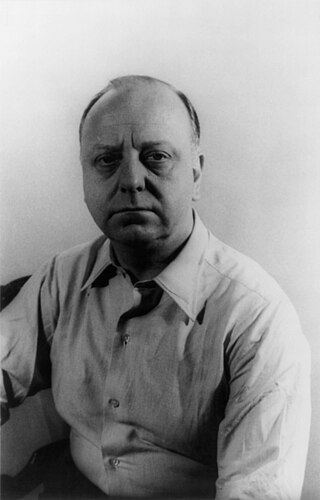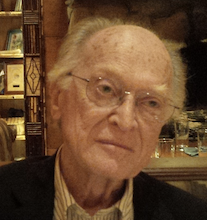
Virgil Thomson was an American composer and critic. He was instrumental in the development of the "American Sound" in classical music. He has been described as a modernist, a neoromantic, a neoclassicist, and a composer of "an Olympian blend of humanity and detachment" whose "expressive voice was always carefully muted" until his late opera Lord Byron which, in contrast to all his previous work, exhibited an emotional content that rises to "moments of real passion".

Music journalism is media criticism and reporting about music topics, including popular music, classical music, and traditional music. Journalists began writing about music in the eighteenth century, providing commentary on what is now regarded as classical music. In the 1960s, music journalism began more prominently covering popular music like rock and pop after the breakthrough of The Beatles. With the rise of the internet in the 2000s, music criticism developed an increasingly large online presence with music bloggers, aspiring music critics, and established critics supplementing print media online. Music journalism today includes reviews of songs, albums and live concerts, profiles of recording artists, and reporting of artist news and music events.

Eugene Ormandy was a Hungarian-born American conductor and violinist, best known for his association with the Philadelphia Orchestra, as its music director. His 44-year association with the orchestra is one of the longest enjoyed by any conductor with any American orchestra. Ormandy made numerous recordings with the orchestra, and as guest conductor with European orchestras, and achieved three gold records and two Grammy Awards. His reputation was as a skilled technician and expert orchestral builder.

Harold Charles Schonberg was an American music critic and author. He is best known for his contributions in The New York Times, where he was chief music critic from 1960 to 1980. In 1971, he became the first music critic to win the Pulitzer Prize for Criticism. An influential critic, he is particularly well known for his encouragement of Romantic piano music and criticism of conductor Leonard Bernstein. He also wrote a number of books on music, and one on chess.
Lord Byron is an opera in three acts by Virgil Thomson to an original English libretto by Jack Larson, inspired by the historical character Lord Byron. This was Thomson's third and final opera. He wrote it on commission from the Ford Foundation for the Metropolitan Opera (Met), but the Met never produced the opera. The first performance was at Lincoln Center, New York City on April 20, 1972, by the music department of the Juilliard School with John Houseman as stage director, Gerhard Samuel as the conductor and Alvin Ailey as the choreographer. A performance of a revised version, by the composer, took place in 1985 with the New York Opera Repertory Theater.
Anthony Carl Tommasini is an American music critic and author who specializes in classical music. Described as "a discerning critic, whose taste, knowledge and judgment have made him a must-read", Tommasini was the chief classical music critic for The New York Times from 2000 to 2021. Also a pianist, he has released two CDS and two books on the music of his colleague and mentor, the composer and critic Virgil Thomson.

Paul Chandler Hume was an American music critic and author who specialized in classical music. He was the music editor for The Washington Post from 1946 to 1982.

Alex Ross is an American music critic and author who specializes in classical music. Ross has been a staff member of The New Yorker magazine since 1996. His extensive writings include performance and record reviews, industry updates, cultural commentary, and historical narratives in the realm of classical music. He has written three well-received books: The Rest Is Noise: Listening to the Twentieth Century (2007), Listen to This (2011), and Wagnerism: Art and Politics in the Shadow of Music (2020).
The Music Library Association (MLA) of the United States is the main professional organization for music libraries and librarians. It also serves corporations, institutions, students, composers, scholars and others whose work and interests lie in the music librarianship field. National meetings occur annually.
Martin Bernheimer was a German-born American music critic who specialized in classical music. Described as "a widely respected and influential critic, who is particularly knowledgeable about opera and the voice", Bernheimer was the chief classical music critic of the Los Angeles Times from 1965 to 1996.
Two American Academy of Arts and Letters Gold Medals are awarded each year by the academy for distinguished achievement. The two awards are taken in rotation from these categories:
Composers Recordings, Inc. (CRI) was an American record label dedicated to the recording of contemporary classical music by American composers. It was founded in 1954 by Otto Luening, Douglas Moore, and Oliver Daniel, and based in New York City.

Paul Henry Lang was a Hungarian-American musicologist and music critic.
Andrew Brian Porter was a British music critic, opera librettist, opera director, scholar, and organist.
Irving Lowens was an American musicologist, critic, and librarian in the Washington, D.C. area. He served as the chief music critic at the Washington Star newspaper, the Assistant Head of the music division of the Library of Congress, and the dean of the Peabody Institute in Baltimore, Maryland. Lowens was president of the Music Library Association, executive board member of the American Musicological Society, and founder of the Music Critics Association of North America and the Sonneck Society, later renamed the Society for American Music. Lowens was instrumental in improving working conditions for American critics as well as increasing standards of criticism. His main interests and scholarly works concerned American tunebooks, of which he held a significant collection. This collection contains some 2,000 volumes including American hymnals and psalm books from the 18th and 19th centuries. The collection now resides at the Moravian Music Foundation in Winston-Salem, NC. While neither Moravian in content nor in origin, the Lowens Collection is an extremely valuable resource for hymnological study, both in music and texts.
Donald Rosenberg is an American musician, music critic and journalist.

Richard Donald Freed was an American music critic, program annotator and administrator. He was noted for the concert program notes he authored for various orchestras and ensembles in the US.

Robert Paul Commanday was an American music critic who specialized in classical music. Among the leading critics of the West Coast, Commanday was a major presence in the Bay Area music scene over a five-decade career. From 1964 to 1994 he was the chief classical music critic of the San Francisco Chronicle, following which he became the founding editor of San Francisco Classical Voice in 1998.
Joshua Kosman is an American music critic who specializes in classical music. The chief classical music critic of the San Francisco Chronicle since 1988, Kosman has a particular interest in contemporary classical music, championing composers such as John Adams and Aaron Jay Kernis. Described by the music critic Jayson Greene as having a "congenial, probing tone that blends a reporter’s instincts with a critic’s acumen," he has written for a variety of other publications.









